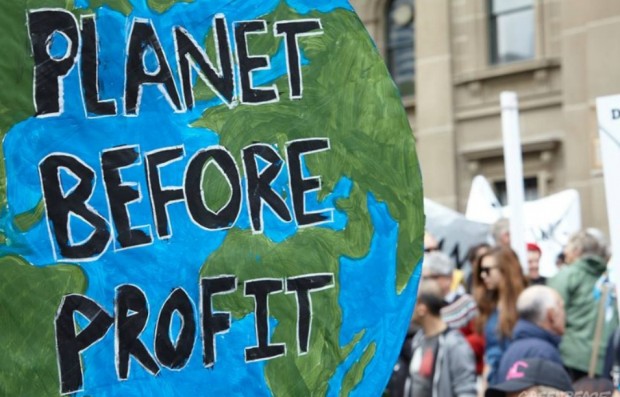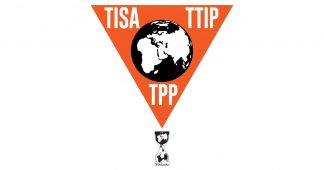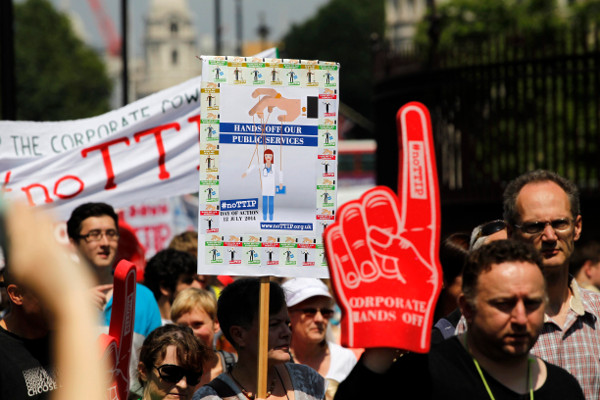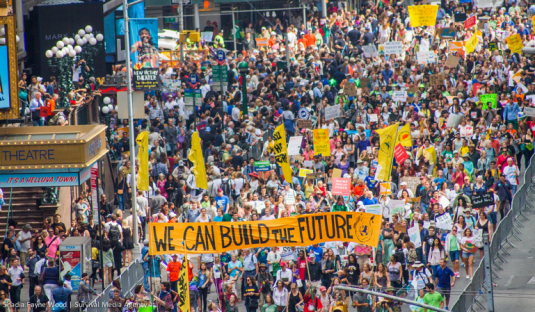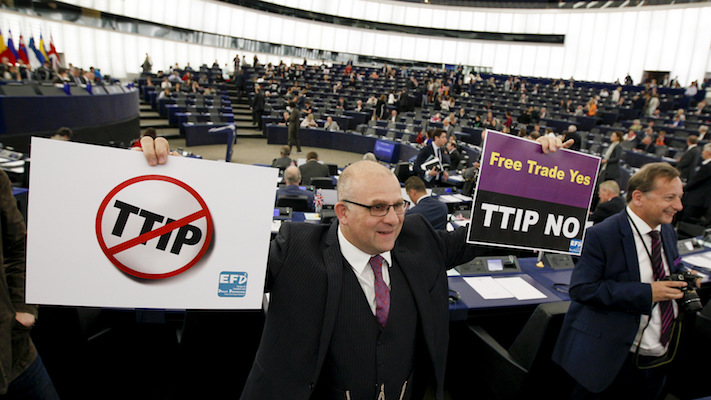In recent years, there’s been a trend toward democracy and market economies. That has lessened the role of government, which is something business people tend to be in favor of. But the other side of the coin is that somebody has to take governments’ place, and business seems to me to be a logical entity to do it.”
David Rockefeller
“Even in democratic countries we are far more poisoned by the totalitarian state of mind than we think..”
Jean Guéhenno, Journal 1937
By Franklin Frederick
Going east or west from Switzerland one would have to cross at least half the planet before reaching the Pacific Ocean. This distance alone makes it very unlikely that Switzerland would get involved with the Pacific Alliance (PA) or in the Trans Pacific Partnership (TPP). However, the Swiss based transnational Nestlé is very much engaged with the PA and its objectives. Nestlé also seems to have a powerful influence on Swiss foreign policy and has managed to get the Swiss government to engage with the PA. At least this is what we learn from the ‘First Youth Meeting of the Pacific Alliance” held in Peru on May 19th 2016.
The following information comes from the website for this event: “The meeting, organized by the PA and Nestlé, brought together top level repre-sentatives from the Ministries of Labor and Education of Chile, Colombia, Mexico and Peru, as well as the State Secretary for Education, Research and Innovation of the Swiss government, Mauro Dell’Ambrogio, business leaders and delegations of young entrepreneurs and students from the four member countries.”
The PA was born as both a reaction and a ‘protection wall’. Its member countries – Colombia, Chile, Peru and Mexico -share an ideology of market deregulation and needed a barrier to protect themselves from the agenda of social inclusion, market regulation and the use of natural resources for national development as defended by the Latin American progressive governments. The main objective of the PA is to promote the TPP. But what are the TPP and all the other trade agreements under negotiation –TTIP, TISA and CETA) – REALLY about? They all share much in common, including the secrecy surrounding their negotiations. What we know is mainly due to the efforts of NGOs such as Greenpeace, Wikileaks and others that disclosed and made available the information about them.
In the case of the TPP, only 6 out of its 30 chapters have anything to do with trade. The rest is mainly about protecting investment rights and corporations from public accountability. We may fairly well assume that this is the pattern for the other trade agreements. Noam Chomsky correctly calls them ‘investors’ rights agreements’. Britain’s former Secretary of State for Trade and Industry Peter Liley – far from being a leftist critic – for instance, manifested his concerns about TTIP like this:
«My three main concerns relate to the Investor-State Dispute Settlement System (ISDS). This creates a system of tribunals – special courts – in which large foreign companies can sue governments (but not vice-versa) for pursuing policies which harm their investments. US companies could sue the UK government should it want to take back into the public sector privately provided services in the NHS, education, and so forth (…)These tribunals give foreign multinationals their own privileged legal system, too costly for smaller foreign companies (since the average case costs $8 million), and from which UK companies are excluded. Moreover, the ‘judges’ are commercial lawyers who, when not serving on a Tribunal, work for, and are therefore sympathetic to, big companies. Cases are heard largely in secret…”
The same goes for TTP, TISA and CETA since as far as we know they all include the ISDS. Former Assistant Secretary of the US Treasury and Associate Editor of the Wall Street Journal, Paul Craig Roberts, – again someone from the “establishment” – wrote in an article with the title: “Trans-Atlantic and Trans-Pacific ‘Partnerships Complete Corporate World Takeover”: “As I have emphasized since these “partnerships” were first announced, their purpose is to give corporations immunity from the laws in the countries in which they do business. The principle mechanism of this immunity is the granting of the right to corporations to sue governments and agencies of governments that have laws or regulations that impinge on corporate profits.(…) The “partnerships” set up “tribunals” staffed by corporations that are outside the court systems of the sovereign governments. It is in these corporate tribunals that the lawsuits take place. In other words the corporations are judge, jury, and prosecutor. They can’t lose. The “partnerships” set up secret unaccountable governments that are higher and have power over the elected governments.”
In fact, TPP, TTIP TISA and CETA were purposefully conceived as instruments to bypass elected governments and if approved and implemented will spell the end of democracy and the complete control of most of the world by the corporate sector. The support of the transnational Nestlé to TTP is thus not surprising, since it will benefit directly from it and from all the other trade agreements.. But
that a country so proud of its democratic tradition as Switzerland should be side by side with Nestlé in promoting it is indeed very disturbing, not to mention that Switzerland is involved in the TISA, which represents a threat to its own highly developed public sector. What urgently needs to be understood and publicly discussed in this context is the fact that the corporate control of the world is actually the fascist project. For Mussolini, the father of fascism, corporations were more efficient than governments and he defended privatization in a way that would agree with the aims of today’s trade agreements and neoliberal ideology in general. As scholar Germa Bel wrote in the Cambridge Journal of. Economics: “Privatization was an important policy in Italy in 1922-1925. The Fascist government was alone in transferring State ownership and services to private firms in the 1920s; no other country in the world would engage in such a policy until Nazi Germany did so between
1934 and 1937.” Maybe nobody wrote better about those issues than the economic historian Karl Polanyi, author of the classic ‘The Great Transformation”. He witnessed the rise of fascism and devoted much effort to understand it in order to better fight it. He has an important message for our time and it is worthwhile going back to what he wrote. In an essay with the title “Marxism Redefined“ Polanyi wrote:
– «Fascism is born from the incompatibility between democracy and capitalism in a fully developed industrial society.».
– «Democracy tends to become the instrument for influence by the working class. Capitalism remains the domain in which production is under the sole control of property owners. Deadlock is inevitable.»
– «Either capitalism or democracy must therefore disappear. Fascism constitutes the solution to this deadlock by allowing capitalism to persist.»
– «The other solution is socialism. Capitalism disappears and democracy remains»
In another article– The essence of fascism – Karl Polanyi wrote : «Basically, the alternative is as follows: extension of the principle of democracy from the political to the economic sphere or the abolition pure and simple of the ‘democratic’ political sphere.»
As Polanyi would put it, the trade agreements are nothing more than the takeover of the political sphere by the economic sphere. In fact, since the XIX century such has been the totalitarian dream of the corporate sector, as Rockefeller expressed it in the very first quotation. Only with complete control of the political sphere will capitalism be free from limits imposed for instance by labor and environmental protection laws. Let’s not be mistaken about it: the REAL aim of all those supporting the trade agreements is to transform the WHOLE of society into a single market where democracy and elected governments will have no meaning anymore. Instead, an elite corporate technocracy will become the real masters of the world. As Polanyi put it:
« After the abolition of the political democratic sphere, economic life alone remains ; capitalism as organised in the different sectors of industry becomes the whole of society. It is the fascist solution. » As a society we are more than half way already into the ‘fascist solution’. In today’s world the concentration of wealth and the consequent inequality has reached unprecedented levels. According to a study by OXFAM, the combined wealth of 1% of the world population is already more than the combined wealth of the remaining 99% In this context, as Polanyi saw it, democracy would naturally promote a more equal distribution of the world’s wealth and even prevent inequality reaching such levels. But the ‘fascist solution’, the war waged on democracy by the 1% has been going on for a long time and has already taken over much of the political discourse of the western world, successfully preventing democracy from actually working. Examples abound. It is important to remember for instance the reaction of the EU and much of the mainstream press when the people of Greece democratically voted NO to the austerity measures imposed by the Troika. I cannot think of a better example of the economic sphere taking control of the political sphere as Polanyi put it than what happened in Greece.
It is revealing to see as well how the mainstream press and most of the western world reacts to Governments defending their political sphere – their democracy – from the corporate /economic sphere takeover. Countries like Venezuela, Cuba, Bolivia for instance– all countries which are NOT taking part in the trade agreements – are seen as LESS democratic or even as straightforward dictatorships. And the current war on democracy by the corporate sector representing the 1% can be very effective, as in the case of Brazil where an elected government, that stubbornly remained out of the trade agreements and was determined to use its natural resources – mainly oil – for its own purposes, was conveniently removed by a ‘soft ‘putsch. The new government quickly announced the opening of the exploitation of oil reserves to foreign corporations, and is willing to engage in the trade agreements and to open to foreign companies the right to buy land in Brazil, against the will of the vast majority of the Brazilian population
We should be clear about the meaning of all this. Such levels of economic inequality and democracy erosion – the fascist project – cannot go on without much violence or even war against a growing number of people. In Latin America the soft putsches in Honduras, Paraguay and Brazil are clear examples of a fascist war against democracy, a violent attempt by the economic sphere to exert definitive control over the political sphere. Once more, Polanyi clearly saw the deep movement underlying the social dynamics of our epoch: “The social history of our time is the result of a double movement: the one is the principle of economic liberalism, aiming at the establishment of a self-regulating market; the other is the principle of social protection aiming at the conservation of man and nature as well as productive organization…” This double movement as Polanyi saw it has reached its climax. The majority of the most developed economies in the world – the EU, the US and Canada –Russia and China are the only ones out – are engaged in the trade agreements, which means that these will have a global reach. Every single state on the planet will be affected by them. As the trade agreements represent the final stage in the complete takeover of the political sphere by the economic sphere – the fascist project – their imposition will result in nothing less than the globalization of fascism. None of us can remain silent or indifferent about this fact!
